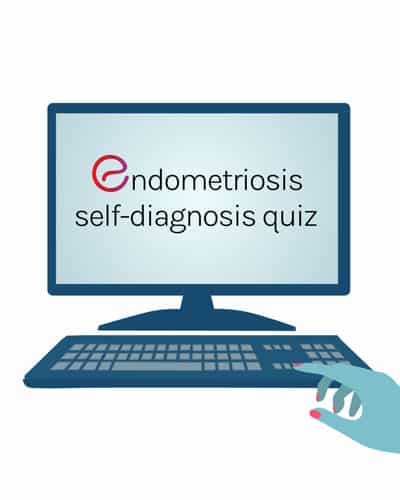Self Diagnosis of Endometriosis

Endometriosis is a chronic disease affecting nearly 176 million women worldwide. Doctors may diagnose the disease using a combination of physical exams and imaging tests. However, a definitive diagnosis is only possible via laparoscopic excision surgery followed by a biopsy of the sample.
There is currently no reliable non-invasive technique to confirm a diagnosis of endometriosis. This is the case, especially in the early stages of the disease. Moreover, symptoms range in severity among patients and the disease stage does not necessarily correlate with the severity of symptoms, which makes diagnosis difficult.
If you think you may have endometriosis, you can do a self-assessment to check your symptoms. You can share the results of this self-assessment with your healthcare provider for a better diagnosis.
Take a self-diagnosis quiz
Start by taking a short quiz online if you think you may have endometriosis or have a family history of the disease.
The number and scope of questions may vary slightly depending on the site. However, generally, they focus on knowing whether you experience pain during periods, intercourse, bowel movements, urination, etc. Support groups also offer an extensive consultation questionnaire that serves as a starting-off point for your healthcare provider in understanding your story and for future reference.
If you answer “yes” to multiple questions in the quiz, you may get a message stating that your symptoms are likely to be caused by endometriosis and you would require further testing for confirmation of the diagnosis.
However, it is important to note that these quizzes are only for self-assessment and are not valid as an official diagnosis. You will have to discuss the results with your healthcare provider for further action.
Watch out for typical signs and symptoms
Apart from taking the quiz, do keep track of typical signs and symptoms that may suggest endometriosis. Some of these include:
- Severe pain during menstruation (dysmenorrhea) that does not subside even after taking non-steroidal anti-inflammatory drugs (NSAIDs) such as ibuprofen (Motrin® or Advil®)
- Painful sexual intercourse (dyspareunia)
- Persistent diarrhea, painful urination, and endo belly
- Worsening of symptoms over time
Have you taken a self-diagnosis quiz? Tell us your experience with self-diagnosing endometriosis. Please comment on our post on Facebook or Instagram.
Get a Second Opinion
Our endometriosis specialists are dedicated to providing patients with expert care. Whether you have been diagnosed or are looking to find a doctor, they are ready to help.Our office is located on 872 Fifth Avenue New York, NY 10065.
You may call us at (646) 960-3080 or have your case reviewed by clicking here.